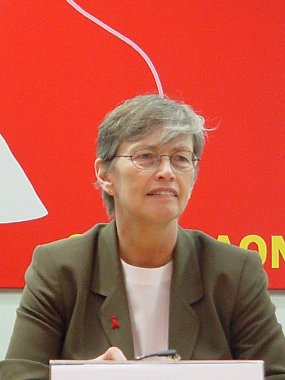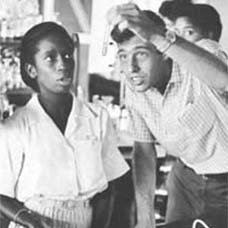
Former Peace Corps Director Carol Bellamy talks with the Australian Broadcasting Corporation about Australian aid to Indonesia
Unclear whether aid packages will meet the needs of children: UNICEF
Reporter: Mark Bannerman
MARK BANNERMAN: The other key focus of talks in Jakarta today has been the form of aid needed to assist children caught in the disaster area. Many countries have given big sums of money, but is it tailored to help the most vulnerable - the thousands of children orphaned or separated from their parents? To answer those questions, I spoke with Carol Bellamy, the Executive Director of UNICEF, the United Nations body responsible for the welfare of children.
MARK BANNERMAN: Carol Bellamy, we've heard about Australia's aid package for Indonesia and Aceh. Now, as the Executive Director of UNICEF, what's your general reaction to it?
CAROL BELLAMY (EXECUTIVE DIRECTOR, UNICEF): Well, I think Australia, once again, is demonstrating that it's prepared to assist, not only in financial assistance but also with true humanitarian aid. I ran into a number of the Australian doctors sent here by the government when I was up in Banda Aceh yesterday, and they are really doing a terrific job.
MARK BANNERMAN: Do you think it's the right thing for Australia to concentrate on Indonesia, as it has?
CAROL BELLAMY: Well, I think that this is a choice that the bilateral donors, as we call them - the governments - can make. I don't think that it is wrong, given how near Indonesia is, and frankly, given the fact that by far the greatest death toll and therefore the greatest displacement is in Indonesia. I hope, certainly through those that will contribute from multi-lateral agencies, that we'll be able to respond to the problems in all of the countries.
MARK BANNERMAN: So is it clear to you yet that this package announced by Australia and others - by America and, say, Germany - have acknowledged the special needs of children?
CAROL BELLAMY: Well, no, it's not clear, but I think that most of these countries have shown some interest in children in the past. We certainly are advocating that, really, you ought to anchor the response in children, given the age of most of these countries, which is a low age. At least 30 per cent of the population of all of these countries is 18 or below, and in some cases it's up to 40 per cent.
MARK BANNERMAN: So in those terms, what kind of role would you like UNICEF to play in Aceh? Is it clear there's a role for you, and that Australia acknowledges that, too?
CAROL BELLAMY: Well, UNICEF is part of the UN. The UN is on the ground. We were on the ground even before this happened. UNICEF is leading in a number of the sectoral areas, working with NGOs and other bilateral partners, for example, focusing on water and sanitation for kids in the camps, focusing on getting kids back into school, focusing on keeping them alive - I mean, we're just starting in Aceh a measles immunisation campaign - and also focusing on trying to protect these children, particularly the ones who've lost parents, so that they are not exploited.
MARK BANNERMAN: Now, in relation to today's meeting, many of the countries have shown their hand. What else would you like to come out of the summit?
CAROL BELLAMY: Well, I don't think this meeting is set necessarily to be breaking news. I think it is to take account of what has been pledged, to have a public acknowledgement of it, which will make it more appropriate to hold these governments and others to the pledges they have made. I think it is a good opportunity to identify some of the gaps. Certainly, on behalf of the UN agencies - and I'm now talking about my colleague agencies like the World Food Program, the World Health Organisation and UNICEF - the Secretary-General will be launching the appeal from the UN agencies today, so we will be able to focus on some of these key areas, such as children, such as basic health, such as getting kids back into school, child protection. So these issues, I hope, will be on the agenda.
MARK BANNERMAN: There have been suggestions, of course, that in the unilateral way that aid has been pledged, that in some respects the United Nations has been kept out of that. Do you get any sense of that?
CAROL BELLAMY: Well, I know there has been some discussion, but you know, whatever people think about the United Nations - and I'd be the last one to say it's perfect; it sure isn't - I think there is no question that when it comes to humanitarian emergencies, the UN is one of THE most critical players. The fact is, even on the ground in Aceh or in Sri Lanka, a lot of non-governmental organisations, a lot of governments, but the fact is, the UN agencies, for the most part, are doing the coordinating in the general sectoral areas, whether it is food, whether it is getting the fisheries going again or whether it is getting kids into school.
MARK BANNERMAN: So do you feel excluded at this point in any way?
CAROL BELLAMY: No, I don't. I don't think that that will occur. Of course governments in some cases are going to put the money directly; of course they're going to put the money through some of their own non-governmental organisations. But the fact is there is no humanitarian emergency in the world today where the UN is not a key major player.
MARK BANNERMAN: Now, you have talked about a tsunami generation, I think. What does that mean exactly, and what are the implications of it?
CAROL BELLAMY: Well, for us the tsunami generation is that huge number of children who we now need to focus on - the children who are alive, who've come through this disaster and are alive. We need to keep them alive, but we need to help create an environment where they will have a good life ahead of them, or at least a decent life. So it means not only avoiding big disease break-outs now, but beginning to set the stage so that these children really can have a future. Get them back to family members if they've lost their parents; immediately try and reunite them with extended family members. Fight hard to make sure that they get to go to school as schools are opening around this region right now. Provide the kind of trauma counselling that might be necessary. You can do that through community workers, you can do that through teachers. These are the kinds of things that will set the stage for these children, never forgetting what happened, but being able to head into the future and have a real life.
MARK BANNERMAN: Do you believe we can minimise the exploitation of children, because we're told already it's happening. I mean, can that be done?
CAROL BELLAMY: It is an issue. I think that there are already actions taking place to try and minimise the exploitation. For example, again, here in Indonesia, while there have been some reports of attempts to start trafficking children, for one only assumes - well, done by criminals, and one only assumes for bad purposes, the fact is the government already has put a moratorium - temporary, but a moratorium - on adoptions of children from Aceh until it can be determined how many children have lost their parents and whether they are with other extended family members. The best way for these children, if they've lost their parents, is at least to remain with their own family before they're taken somewhere. UNICEF is working with the government to do this. We're already registering children so that we can try and reunify them with their family members. But it is a big worry that there are bad elements out there. It's like looters taking advantage of the darkness. We can't let that happen to these children.
MARK BANNERMAN: Carol Bellamy, thank you very much for talking with us tonight.










